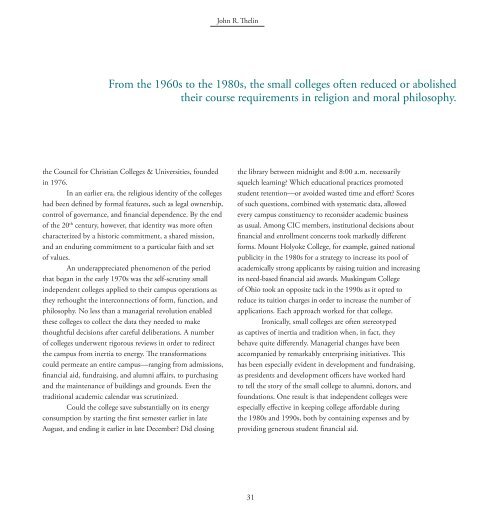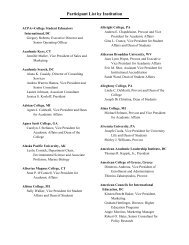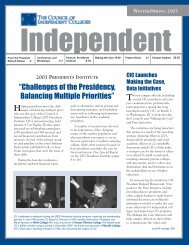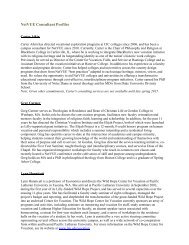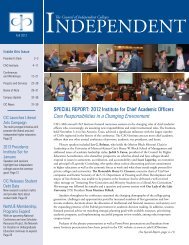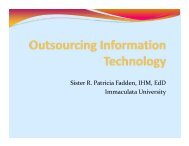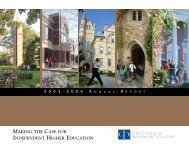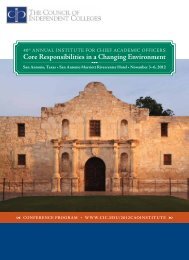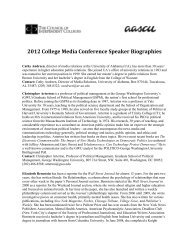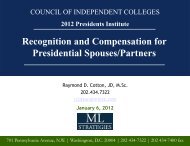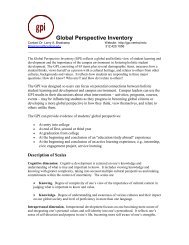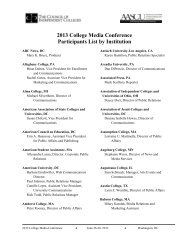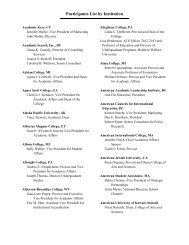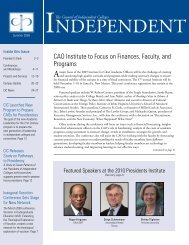Meeting the Challenge: - The Council of Independent Colleges
Meeting the Challenge: - The Council of Independent Colleges
Meeting the Challenge: - The Council of Independent Colleges
You also want an ePaper? Increase the reach of your titles
YUMPU automatically turns print PDFs into web optimized ePapers that Google loves.
John R. <strong>The</strong>lin<br />
From <strong>the</strong> 1960s to <strong>the</strong> 1980s, <strong>the</strong> small colleges <strong>of</strong>ten reduced or abolished<br />
<strong>the</strong>ir course requirements in religion and moral philosophy.<br />
<strong>the</strong> <strong>Council</strong> for Christian <strong>Colleges</strong> & Universities, founded<br />
in 1976.<br />
In an earlier era, <strong>the</strong> religious identity <strong>of</strong> <strong>the</strong> colleges<br />
had been defined by formal features, such as legal ownership,<br />
control <strong>of</strong> governance, and financial dependence. By <strong>the</strong> end<br />
<strong>of</strong> <strong>the</strong> 20 th century, however, that identity was more <strong>of</strong>ten<br />
characterized by a historic commitment, a shared mission,<br />
and an enduring commitment to a particular faith and set<br />
<strong>of</strong> values.<br />
An underappreciated phenomenon <strong>of</strong> <strong>the</strong> period<br />
that began in <strong>the</strong> early 1970s was <strong>the</strong> self-scrutiny small<br />
independent colleges applied to <strong>the</strong>ir campus operations as<br />
<strong>the</strong>y rethought <strong>the</strong> interconnections <strong>of</strong> form, function, and<br />
philosophy. No less than a managerial revolution enabled<br />
<strong>the</strong>se colleges to collect <strong>the</strong> data <strong>the</strong>y needed to make<br />
thoughtful decisions after careful deliberations. A number<br />
<strong>of</strong> colleges underwent rigorous reviews in order to redirect<br />
<strong>the</strong> campus from inertia to energy. <strong>The</strong> transformations<br />
could permeate an entire campus—ranging from admissions,<br />
financial aid, fundraising, and alumni affairs, to purchasing<br />
and <strong>the</strong> maintenance <strong>of</strong> buildings and grounds. Even <strong>the</strong><br />
traditional academic calendar was scrutinized.<br />
Could <strong>the</strong> college save substantially on its energy<br />
consumption by starting <strong>the</strong> first semester earlier in late<br />
August, and ending it earlier in late December Did closing<br />
<strong>the</strong> library between midnight and 8:00 a.m. necessarily<br />
squelch learning Which educational practices promoted<br />
student retention—or avoided wasted time and effort Scores<br />
<strong>of</strong> such questions, combined with systematic data, allowed<br />
every campus constituency to reconsider academic business<br />
as usual. Among CIC members, institutional decisions about<br />
financial and enrollment concerns took markedly different<br />
forms. Mount Holyoke College, for example, gained national<br />
publicity in <strong>the</strong> 1980s for a strategy to increase its pool <strong>of</strong><br />
academically strong applicants by raising tuition and increasing<br />
its need-based financial aid awards. Muskingum College<br />
<strong>of</strong> Ohio took an opposite tack in <strong>the</strong> 1990s as it opted to<br />
reduce its tuition charges in order to increase <strong>the</strong> number <strong>of</strong><br />
applications. Each approach worked for that college.<br />
Ironically, small colleges are <strong>of</strong>ten stereotyped<br />
as captives <strong>of</strong> inertia and tradition when, in fact, <strong>the</strong>y<br />
behave quite differently. Managerial changes have been<br />
accompanied by remarkably enterprising initiatives. This<br />
has been especially evident in development and fundraising,<br />
as presidents and development <strong>of</strong>ficers have worked hard<br />
to tell <strong>the</strong> story <strong>of</strong> <strong>the</strong> small college to alumni, donors, and<br />
foundations. One result is that independent colleges were<br />
especially effective in keeping college affordable during<br />
<strong>the</strong> 1980s and 1990s, both by containing expenses and by<br />
providing generous student financial aid.<br />
31


